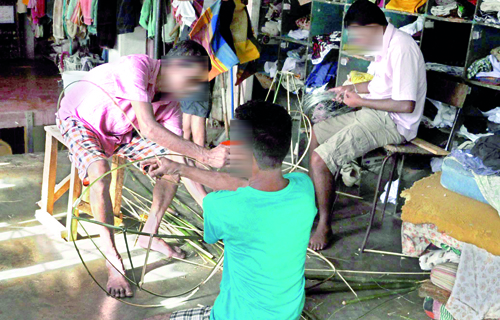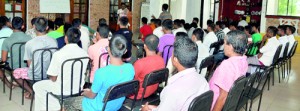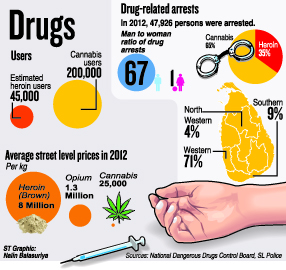News
They come in as drug addicts and go out as new men
Twenty-one-year old Thilina was studying for his Advanced Level examination at a leading school in Matara when a friend introduced him to heroin. By then he was already smoking and drinking occasionally, a habit he picked up when he was around 15. Hence trying a

Making lanterns for Poson. Pix by Ranjith Perera
new substance that would give him a bigger kick did not feel any more dangerous than in what he was already indulging. Within a year he had become heavily addicted to heroin and could no longer hide it from his parents. He had grown lean and was falling sick often. His father, an engineer and his mother a music teacher were desperate to wean their son away from drug use and took him to different medical facilities to cure him of his addiction, but each time he returned home after a few months of treatment, he would start taking heroin again. It was then that his parents heard of Mithuru Mithuro Sevana at Pelmadulla and enrolled him there to cure him of his addiction. Sixteen months later, Thilina has a completely different outlook on life. The most important lesson, Thilina says he’s learnt is to take responsibility for his actions and not blame others for what went wrong in his young life.
Sarath Kumara (37) was running a successful vegetable business in Ratmalana. With a caring wife and three young sons, he made enough money to lead a comfortable life. He had started smoking at the age of 16 and began taking alcohol soon afterwards, but he was able to take care of his family and manage his business without allowing cigarettes and liquor to overtake his life.

Time for reflection
His troubles began when his father, an employee of the Ports Authority was given Rs. five million as compensation when he was laid off work and Sarath Kumara was given half of this amount. “Once I got the money, I became careless and started spending time in the company of some friends who were regular gamblers and frequented night clubs,” he said.
He was introduced to heroin when two of his friends asked him for Rs. 3,000 to buy “some stuff.” “I asked them why they wanted so much money for alcohol. They said it was not for alcohol but for something else. I gave them Rs. 6, 000 and asked them to get some of what they were having for me to try.” That was way back in 2003. For ten years after snorting his first stick of heroin, Sarath Kumara has been a heroin addict, lavishly using his money to feed his craving, neglecting his family and bringing his business to the point of ruin.
He spent over Rs.15, 000 a day on heroin; going to peddlers he had befriended in the area. “Once I become an addict, I was part of the network through which I could find what I wanted.”
The turning point came late last year when his older son who is now 18 refused to go to school after being taunted by his schoolmates over his father‘s drug use. “By then my wife and other family members knew I was taking heroin. My brother –in –law who is a police officer encouraged me to come to this rehabilitation centre and I agreed. I did not want my son to jeopardise his studies because of me,” he said.Six months into his treatment programme, Sarath Kumara already feels like a new man. “Now I realise what a fortunate person I am. I have a supportive family and a good business. I now understand my responsibilities towards my family,” he said.
The stories of Thilina and Sarath Kumara are not unusual ones. They are among thousands of Sri Lankans, mainly young males who become addicted to heroin and other dangerous drugs. While there are no records of the exact number of addicts in the country, Police estimate the number around 45,000 heroin addicts and 200,000 cannabis addicts respectively.
Ven. Kuppiyawatte Bodhananda Thera who runs Mithuru Mithuro Sevana has spent nearly 25 years helping those addicted to substance abuse. The Centre, nestled amidst lush mountain ranges and tea bushes makes an ideal setting for those learning to break free from the shackles of substance abuse.
Ven Bodananda Thera began the Centre in 1987 which then consisted of a small shack. Starting with four prisoners who were on parole prior to ending their prison terms, for three years the Centre functioned as a half-way home for prisoners before they entered society after completing their prison terms. With drug addiction growing among the population, the Thera decided to help them by providing them with in-house treatment at the Centre.
“I lived down Eliot Place in Borella which is near the Welikada Prison. From an early age I used to see prisoners being led bound by chains around their hands and legs. I was deeply troubled by the treatment meted out to them and decided that one day I would do something that would help even those marginalised by society to live with dignity, be they be prisoners or drug addicts.”
The Thera was still a student at Nalanda College in Colombo then but his resolve persisted into adulthood. Having completed his Advanced Level examination, he decided to become a Buddhist monk and was ordained at the age of 20.

A joint counselling session
Today, there are around 80, mainly young men between the ages of 16 and 30 who undergo treatment at the Centre which adopts the method used by the Day Top Organisation in the USA to treat substance abuse victims. Over the years more than 5,000 young men have followed this year-long programme and a majority of them have gone onto to lead normal lives.
At joint counselling class, each of the clients discusses a positive deed he has experienced that day. The counsellor draws an illustration on a white board depicting a boy carrying a heavy sack on his shoulders entering the center. “Once you come in here and leave, you will leave this baggage behind and start a new life,” he says.
Despite the success of his programme, the Thera says there is an increasing trend of substance abuse among young boys, mainly school children. “Many are not taking heroin as yet but they are trying other kinds of addictive pills which will eventually lead to heroin,” he says. Many who seek treatment at the Centre come from affluent families and a majority have been introduced to heroin and other drugs by those they consider close friends.A classic example is Adikari (22), from Boralesgamuwa. A straight A student who had his primary education at a leading school in Colombo he went onto complete two years of an internationally recognised  accountancy examination, but all the while was being drawn deeper into the world of drugs.
accountancy examination, but all the while was being drawn deeper into the world of drugs.
He started smoking when he was in the Ordinary Level classes and while in the A/L classes he got into the habit of clubbing with children from affluent families and those with politically powerful parents. At the clubs, he was introduced to different kinds of pills and soon he was taking heroin. “As I was doing well in my studies, my mother, a banker, would always give me money whenever I asked for it. I would tell her that I needed money for a class or for an examination and used it to buy drugs. Initially my friends provided me the heroin but soon I was part of the network and found it easy to find the suppliers. I would spend Rs. 3,000-4,000 a day for heroin.”
Initially his parents did not know about his secret indulgence but one day when his mother found a packet of heroin in his room, she confronted him. “I had to tell her the truth. It was hard on my mother because she always trusted me and did not think I would do anything wrong.”
Initially Adikari was taken for medical treatment to different hospitals but he did not respond well. Ten months ago he was brought to the Pelmadulla Centre and since then he has a different outlook on life. “I was naive to think that some people I associated with were good friends. My heroin addiction only hurt my family and those I love.”
Today Adikari is one of the group leaders at the Centre. He visits schools along with Bodananda Thera speaking to schoolchildren about the harmful effects of drug use. “One thing that makes young people indulge in drugs is lack of self-esteem. It gives us a kick and makes us feel brave but it is not real. Since coming here and after taking part in the programme, I am able to stand up before a crowd of 2,000 people and speak without fear,” he said For Bodananda Thera, who also serves as an appointed member of the National Dangerous Drugs Control Board (NDDCB), seeing each person overcome his addiction by his own will power is the greatest reward. But his wish is not to see more people coming for treatment but to see the numbers lessen. “Unfortunately young people, both at home and in schools, are not getting the kind of attention they need during their growing up years. School education has become mechanical and the system ignores the real talents of children and hence they lose self-esteem and resort to taking drugs, smoking and drinking.
Government programmes are also not directed in the right path to deal with this problem effectively,” the Thera added.

